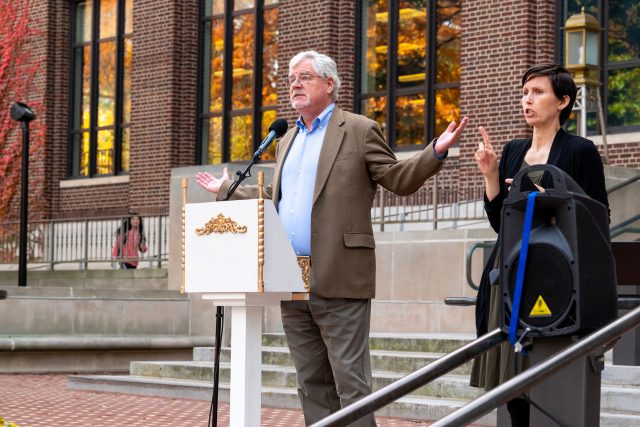[ad_1]
The Political Speech and The Public Square speaker series concluded with its last event in the Diag on Tuesday, giving University of Michigan students and faculty members the chance to give short speeches about Israel’s ongoing military campaign in Gaza. The series, which began on Sept. 10, centered around the theme “What’s at Stake for Me in the 2024 Election?” and included four events focused on various topics. Previous events in the series covered climate change and reproductive rights.
LSA sophomore Matan Berg, president of the U-M chapter of J Street U, an organization working toward a two-state solution, was one of the speakers at the event. Berg said in his speech that he appreciated the chance to engage in conversations with students at a Gaza Solidarity Encampment event in the Diag last semester, despite their conflicting stances. He said hopes the University can implement this level of unity under its new institutional neutrality policy.
“Regardless of neutrality, I think it’s imperative that the University promotes dialogue (and) coalition building between different communities, particularly on this issue,” Berg said. “The students know that we will not just watch blindly as all this happens. We’re going to take some stances, and I hope the University promotes the facilitation of dialogue and shared humanity.”
Rackham student Khadija Shafiq was the second speaker at the event and urged people to prioritize the violence and suffering in Gaza when casting their votes.
“The fight for dignity and any form of identity begins with the simple right to life, and the U.S. has to at least protect that in the Middle East,” Shafiq said. “I perceive that every U.S. citizen’s moral duty to be that they vote for a candidate who promises less civilian death, who holds government and institutions accountable for the suffering they cause.”
Shafiq said she understands the motivations of people who are planning to vote for Green Party nominee Jill Stein, who has pledged to end US military aid to Israel, but argued that may be fruitless given current political circumstances.
“In a swing state like Michigan, I don’t think it’s the best option,” Shafiq said. “Right now, I think the vote has to be to make things not worse.”
Guest speaker Arik Cheshin, a visiting psychology professor from the University of Haifa in Israel, expressed said in his speech that he hopes to see Palestinians and Israelis both come to the table to work toward a resolution.
“It’s time to come together and try to solve this problem,” Cheshin said. “I do believe it’s possible, and I do believe it can be resolved.”
LSA freshman Penelope McGovern attended the event to gain insight on the ongoing Israeli military campaign in Gaza and escalating violence in the Middle East. In an interview with The Daily, McGovern said she hopes the upcoming elections will provide an avenue for foreign policy change.
“I really want someone to do something,” McGovern said. “It annoys me that America gets to have a say in these things that are completely unrelated to us because we stuck our nose in it and we’re a global superpower.”
Berg told The Daily that he appreciated the diversity of the event speakers in terms of their education level, student status and backgrounds.
“I’d love for there to be more speakers, always,” Berg said. “But I think that we got a faculty perspective and two students from the undergrad and graduate level, from different communities with different viewpoints. And I think that was a positive thing to have when people are in dialogue with each other.”
Daily News Contributor Emma Sulaiman can be reached at emmasul@umich.edu.
Related articles
[ad_2]
Source link











